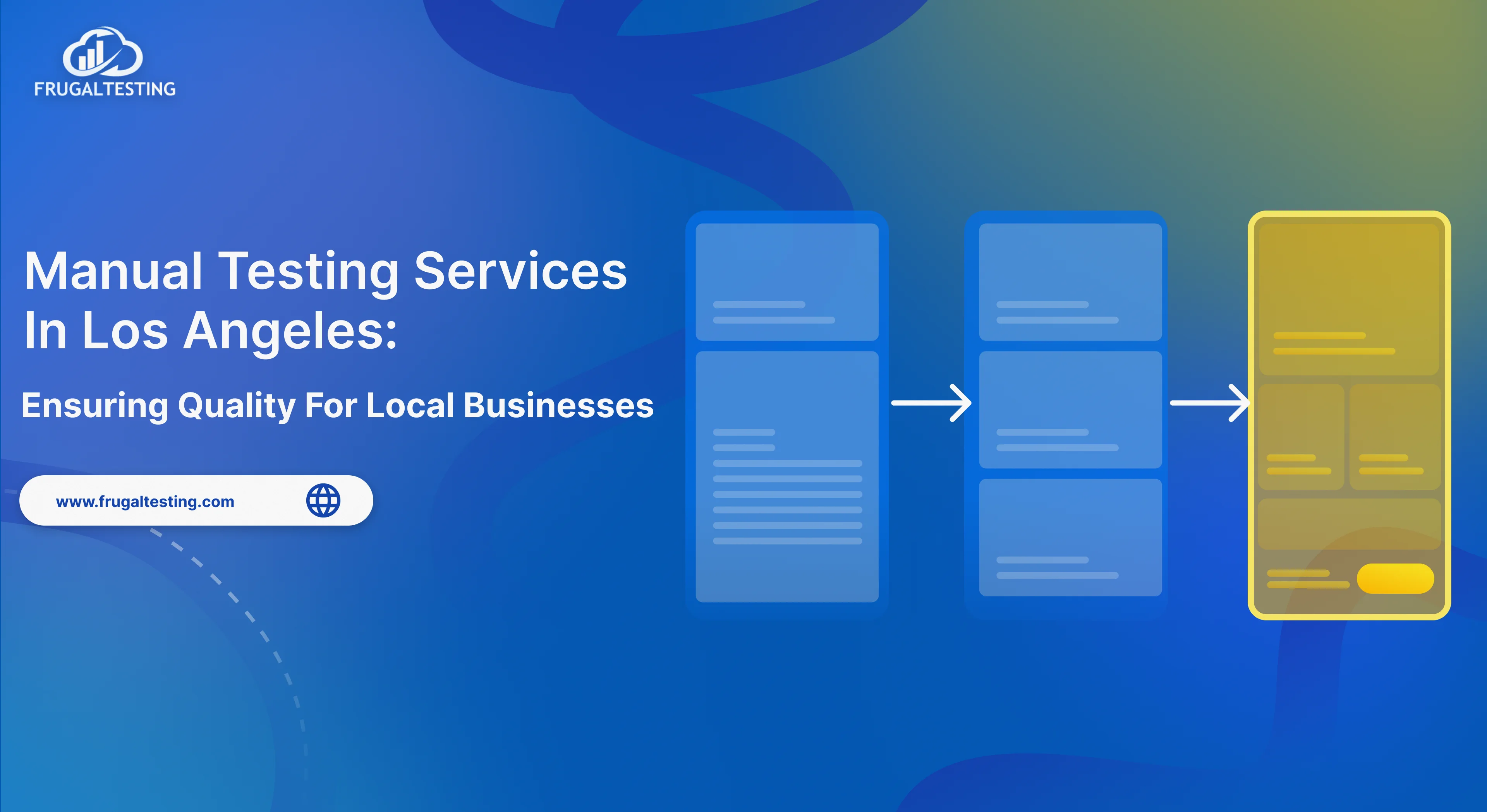Conformity to regulatory norms is essential in the quickly changing field of financial technology, or fintech. Innovative financial services have created previously unheard-of opportunities, but they have also presented difficult regulatory issues. RegTech, or regulatory technology, delivers scalable regtech solutions and advanced regulatory compliance tools that automate financial compliance.
RegTech's use of state-of-the-art technology that automates and streamlines compliance processes allows fintech companies to meet regulatory standards without sacrificing innovation. RegTech enables businesses to remain ahead of compliance requirements while lowering the risk of fraudulent activity by addressing changing regulatory standards within the financial sector. Any business must comprehend what RegTech is and how it fits into the larger financial ecosystem in the fiercely competitive financial industry of today.
Unlock the Full Potential of RegTech Below:
📌 Why RegTech Is Transforming Fintech Compliance – Automating regulatory tasks to reduce cost, risk, and manual overhead.
📌 Core Technologies Powering RegTech – How AI, machine learning, blockchain, and RPA streamline KYC, AML, and reporting.
📌 Core Technologies Powering RegTech – AI, ML, blockchain, and RPA drive efficient KYC, AML, and regulatory reporting.
📌 Integrating RegTech into Fintech Workflows – Embedding compliance automation into KYC/AML pipelines and real-time monitoring systems.
📌 Tackling Global Compliance Challenges – Navigating cross-border regulations, GDPR, and evolving legal landscapes with CaaS.
📌 Tackling Global Compliance Challenges – Navigates cross-border regulations and frameworks like GDPR with scalable solutions.
What Is RegTech? Understanding Its Role in Fintech Compliance
A subcategory of financial technology known as "RegTech" is devoted exclusively to technologically advanced solutions that make regulatory compliance services easier. It streamlines the compliance environment for fintech firms, particularly fintech businesses, by deploying modern regtech software designed for speed, scale, and efficiency.
The Evolution and Definition of RegTech:
The regtech meaning has evolved over time, especially after 2015, when the phrase "RegTech" gained popularity. Its primary objective is to automate tasks connected to compliance in order to lower regulatory risks and expenses. Unlike traditional compliance methods, which are often laborious, cumbersome, and prone to errors, RegTech compliance solutions are designed for speed, accuracy, and scalability.
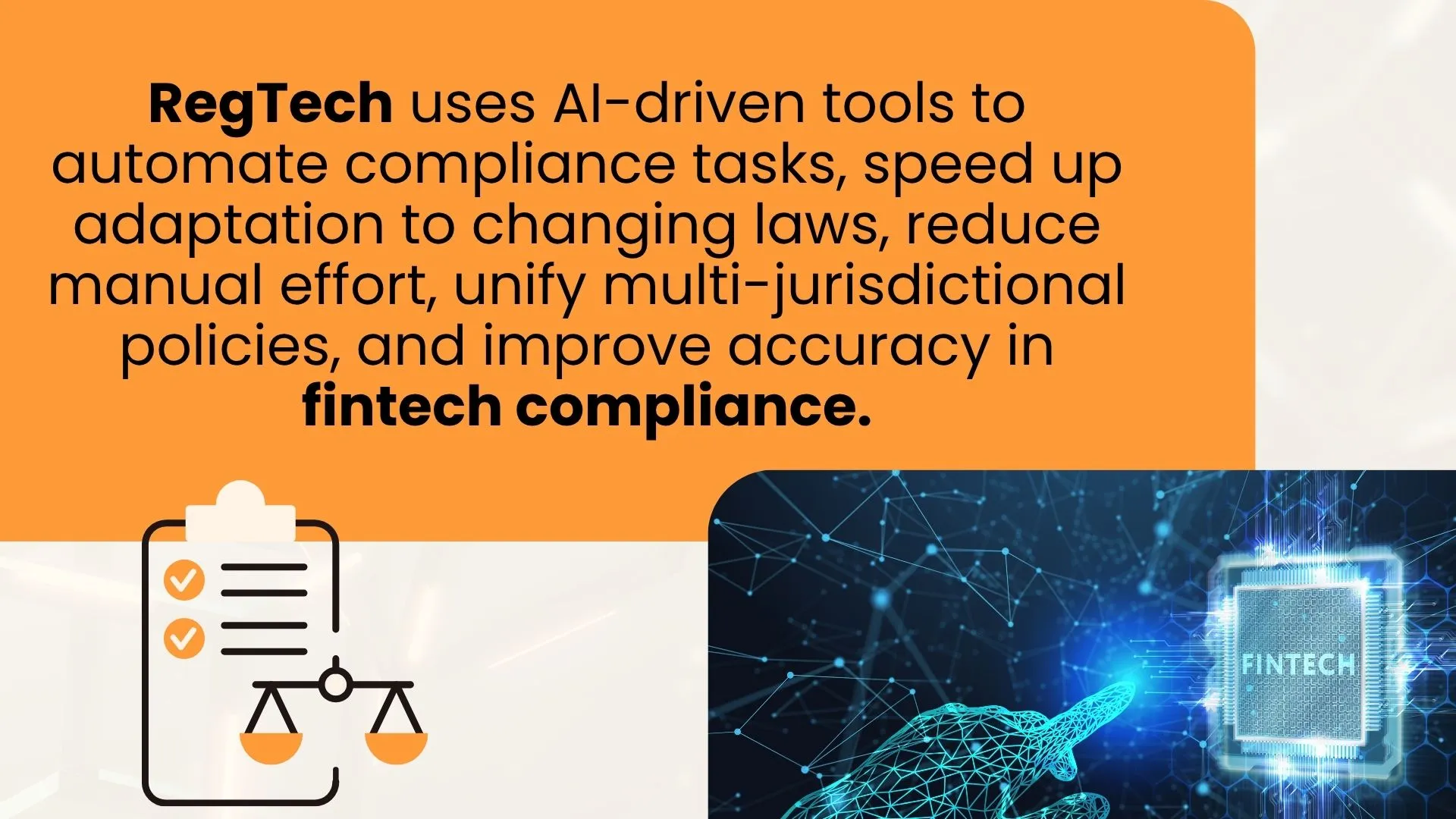
How RegTech Works in Fintech:
- Automating standard compliance processes, such as identification verification, transaction monitoring, and reporting.
- Real-time analytics and data processing: Enabling fintech businesses to quickly identify questionable activity or possible legal violations.
- Centralized compliance management is the process of combining several legal requirements from various countries into one platform.
- Risk management: Proactively evaluate compliance risks using cutting-edge AI and machine learning algorithms.
Why RegTech is Essential for Fintech?
Regulations are constantly changing, and fintech businesses operate in a high-risk environment. Regtech software implementation enhances the overall security posture, cuts expenses, and lessens the workload for compliance personnel. It guarantees ongoing compliance with regulatory frameworks, including Know Your Customer (KYC) standards, anti-money laundering (AML) laws, and data privacy regulations like GDPR.
Why Compliance Is Essential for Fintech Companies and How RegTech Helps
Compliance is essential to maintaining operational integrity and gaining the trust of customers, and it goes beyond merely meeting legal requirements. Due to the sensitive nature of financial data and transactions, the stakes are much higher for fintech companies.
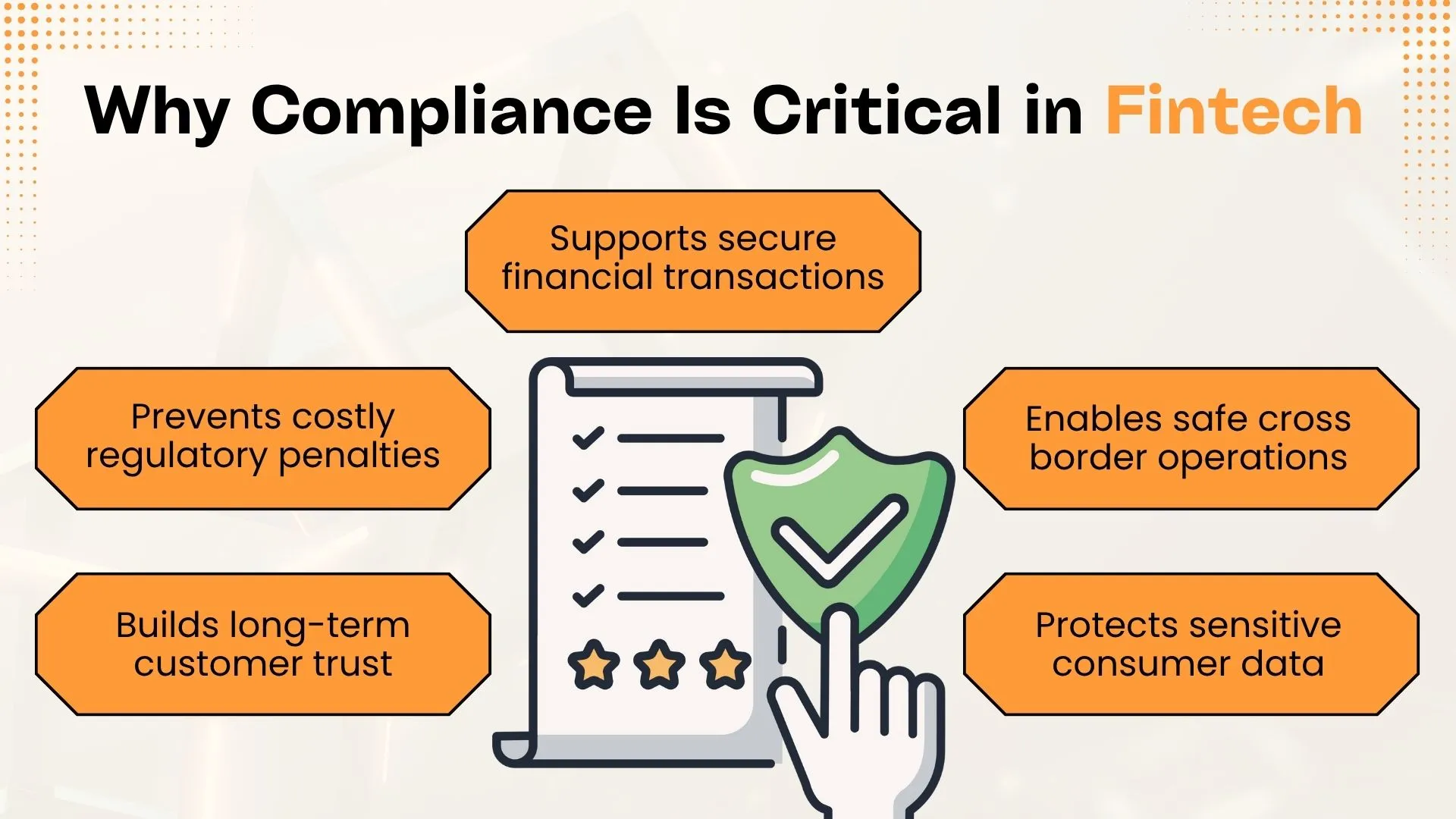
The Compliance Landscape in Fintech:
Fintech businesses have to deal with a complex web of rules, such as but not restricted to:
- The Dodd-Frank Act in the US, PSD2 in Europe, and Basel III globally are regulations that deal with fintech compliance.
- AML and KYC are essential for stopping money laundering, fraud, and the funding of terrorism.
- Data protection regulations, such as the CCPA, GDPR, and others, specify how consumer data must be managed.
- Risk management: To reduce operational, financial, and reputational hazards.
How RegTech Solutions Address Compliance Challenges:
- Automating KYC: Manual KYC processes are laborious and prone to errors. RegTech compliance products enhance client onboarding experiences by functioning as advanced regtech compliance solutions and integrating regulatory compliance tools into fintech workflows.
- By automating the creation and submission of compliance reports, regulatory reporting lowers the possibility of penalties for incomplete or delayed files.
- Cross-border Compliance: Using integrated compliance management solutions platforms, these platforms often act as a regtech docking solution for seamless cross-jurisdictional compliance.
- Compliance Risk Management: Dashboards and advanced analytics help prioritize mitigation strategies and offer insights into new hazards.
The Impact of Non-Compliance:
Serious repercussions for noncompliance may include fines, license suspension, and harm to a brand's reputation. By ensuring that fintechs maintain constant compliance while concentrating on innovation, RegTech helps to reduce these risks.
Core Technologies Behind RegTech Solutions Simplifying Compliance
RegTech businesses create scalable and efficient compliance tools by utilizing a variety of cutting-edge technologies.
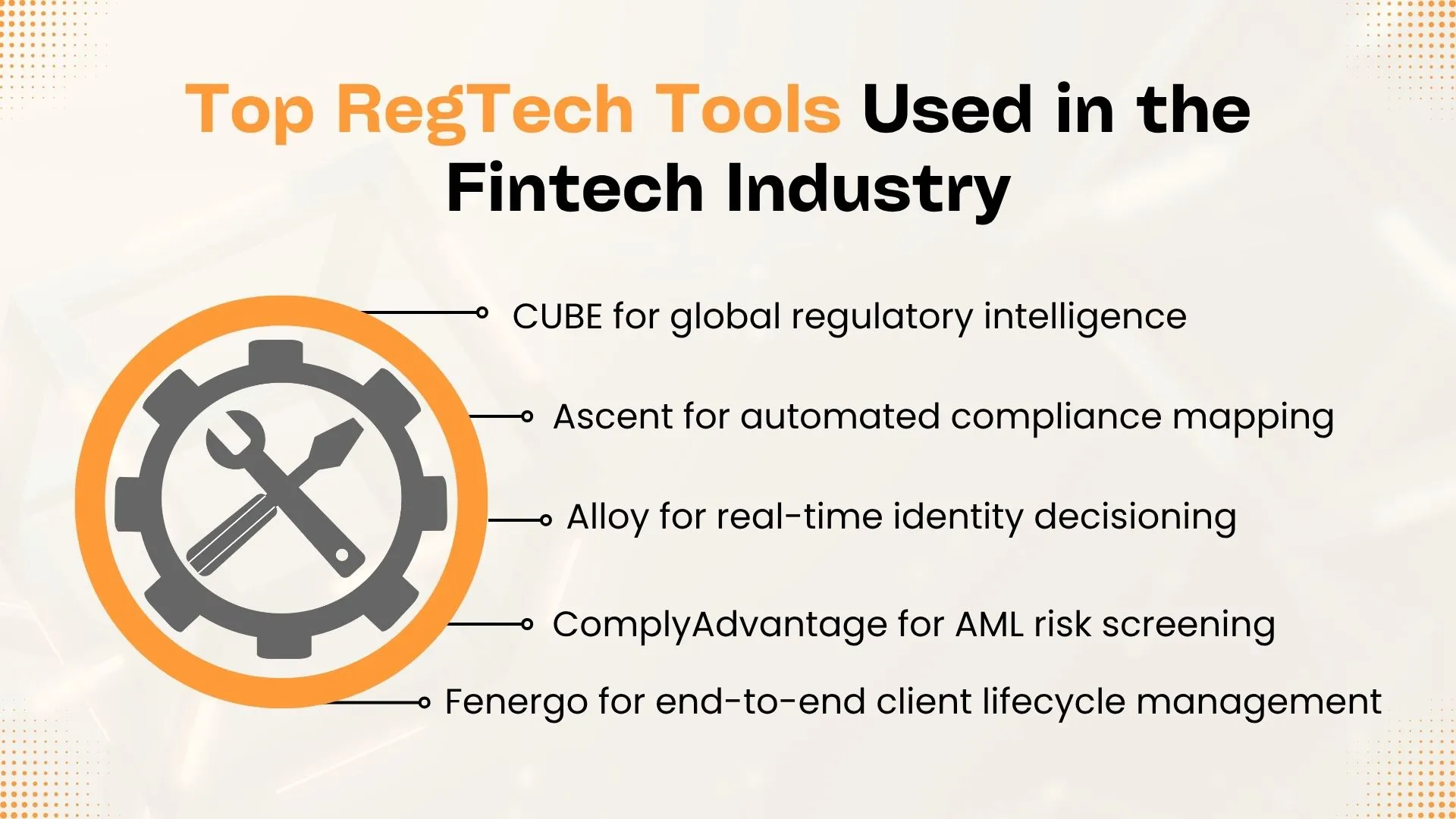
Core AI and Data Technologies Driving RegTech Innovation:
- AI/ML models are foundational to many RegTech software solutions, offering intelligent automation and insight-driven compliance. Key applications include:
- Finding irregularities in transaction data that can point to fraud or money laundering is known as pattern recognition.
- Predictive analytics helps businesses prioritize their response efforts by forecasting compliance issues.
- Natural Language Processing (NLP): Helps compliance teams comprehend complicated regulations by enabling automated reading and interpretation of regulatory materials.
- Big Data Analytics
- RegTech technologies can produce meaningful insights for regulatory compliance software solutions, such as identifying high-risk consumers or transactions, by analyzing vast amounts of data.
- Blockchain Technology
- Provides immutable records of transactions and activities, increasing the transparency and auditability of compliance operations.
- Cloud Computing
- Allows fintech companies to access compliance management software without having to make large upfront costs thanks to its scalable infrastructure. Better collaboration and real-time updates are also made possible by cloud-based technologies.
- Robotic Process Automation (RPA)
- RAP frees up human resources for higher-value tasks by handling data entry and workflow management, a key feature of regtech compliance tools today.
Practical Applications: How RegTech Streamlines KYC, AML, and Other Compliance Processes
Certain compliance activities provide the finest understanding of the practical impact of RegTech solutions in fintech.
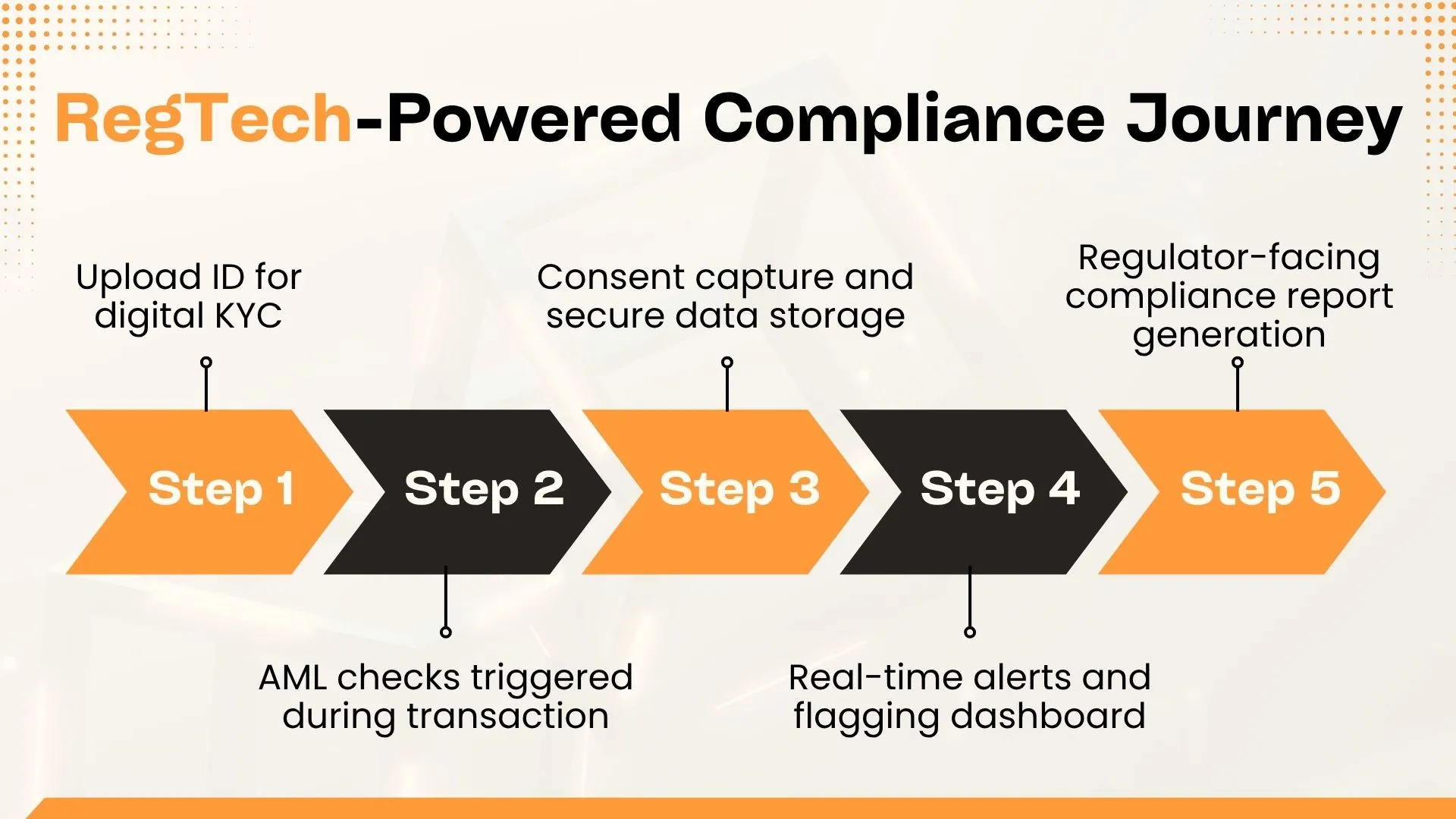
KYC (Know Your Customer)
- Digitized Identity Verification: To expedite onboarding, customers can use digital IDs or biometrics to confirm their identities through e-KYC.
- Continuous Monitoring: RegTech tools run background checks against PEP (Politically Exposed Persons) databases and international sanction lists continuously.
- Data Accuracy: Automated procedures minimize mistakes and discrepancies in client information.
- Fintech companies often rely on regtech docking solutions to unify onboarding, verification, and background checks.
AML (Anti-Money Laundering)
- Transaction Monitoring: Constant, real-time transaction scanning helps identify questionable regtech trends and sets off alarms for manual examination.
- Risk-Based Scoring: Prioritized evaluations are made possible by assigning a score to customers and transactions based on their level of risk.
- Compliance Reporting: Suspicious Activity Reports (SARs) are automatically generated and filed with authorities on time.
Other Compliance Functions
- GDPR Compliance: RegTech products assist fintech companies in tracking consent, managing data subject rights, and notifying data breaches.
- GRC stands for Governance, Risk, and Compliance. Integrated solutions combine governance policies, risk assessments, and compliance operations into a single dashboard.
- Maintenance of Audit Trails: Secure logs and blockchain technology offer clear, impenetrable records for regulatory evaluations and audits.
How RegTech Enhances Compliance Efficiency for Fintech Companies
Strong and scalable regulatory compliance is crucial as fintech continues to upend traditional finance. Regulatory technology, or RegTech, provides digital-first solutions to streamline and automate financial firms' adherence to constantly changing AI in fintech compliance regulations and standards. Here are several ways that RegTech greatly increases the effectiveness of compliance for contemporary fintech companies.
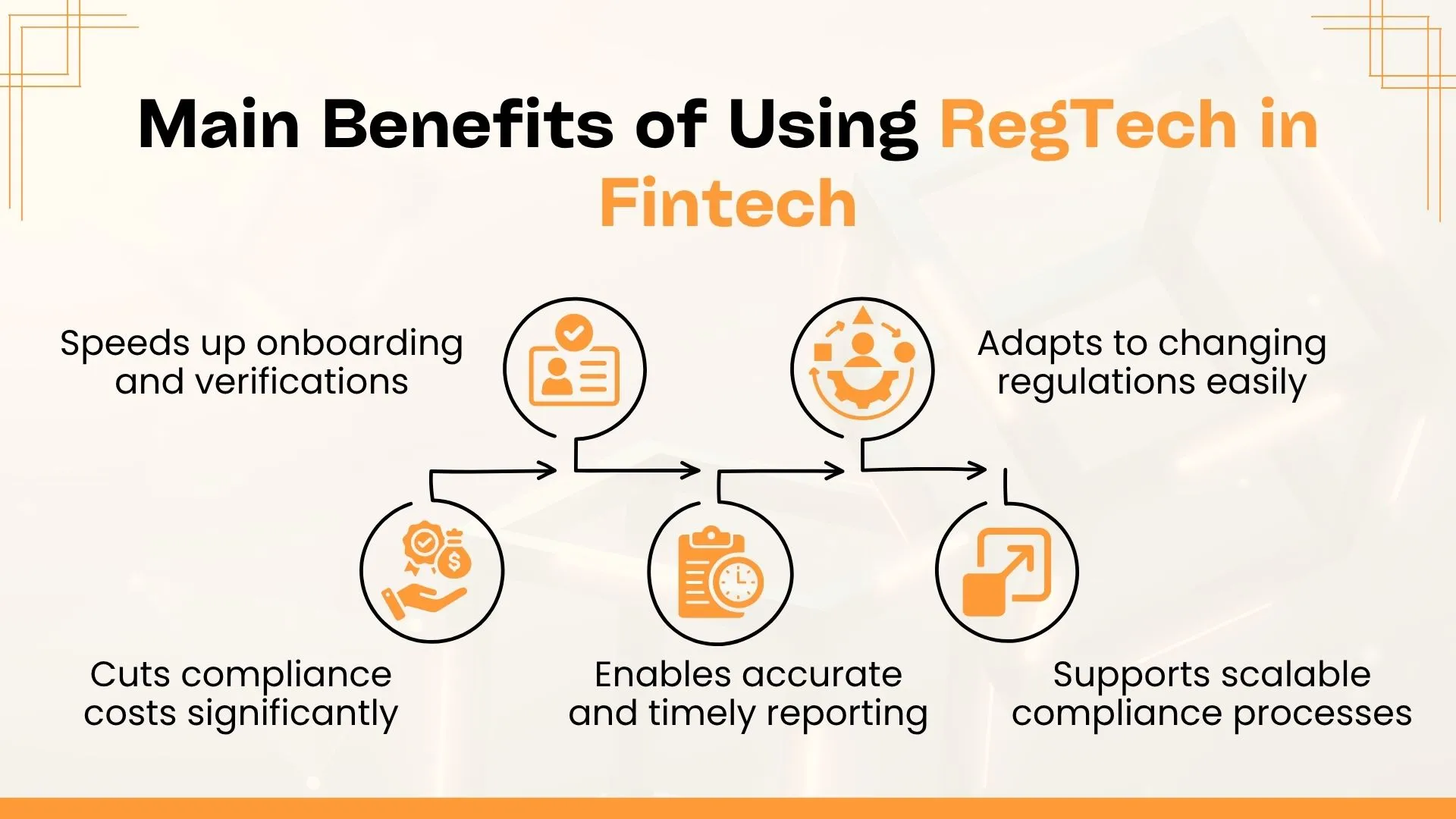
Key Ways RegTech Boosts Efficiency:
- Automates Tasks Related to Compliance: Using cutting-edge regtech software and compliance tools, RegTech automates repetitive tasks, decreasing human error and expediting compliance checks.
- Allows for Real-Time Monitoring: Fintechs can swiftly adjust to changes in regulations and identify risks early with the help of regtech compliance technologies.
- Simplifies AML KYC procedures: Workflows for digital e-KYC and AML provide security and adherence to AML standards while speeding up onboarding.
- Enhances Risk Control: Teams effectively manage governance risk and compliance using centralized regtech compliance tools that offer real-time dashboards and insights.
- By integrating gdpr compliance workflows into daily operations, RegTech helps fintechs stay audit-ready putting effective gdpr compliance strategies into action.
- Leverages Leading RegTech Products: Prominent regtech companies like Apex Fintech Solutions, CUBE, and Ascent RegTech offer state-of-the-art systems to maintain agility and audit readiness.
RegTech is more than just a fad; it is revolutionizing fintech compliance by guaranteeing accuracy, speed, and confidence in a constantly shifting regulatory environment.
Emerging Regulatory Trends and the Future of RegTech in the Fintech Industry
Real-time compliance, automation powered by AI, and international cooperation with regulatory agencies are the main drivers of RegTech's future in the fintech industry.
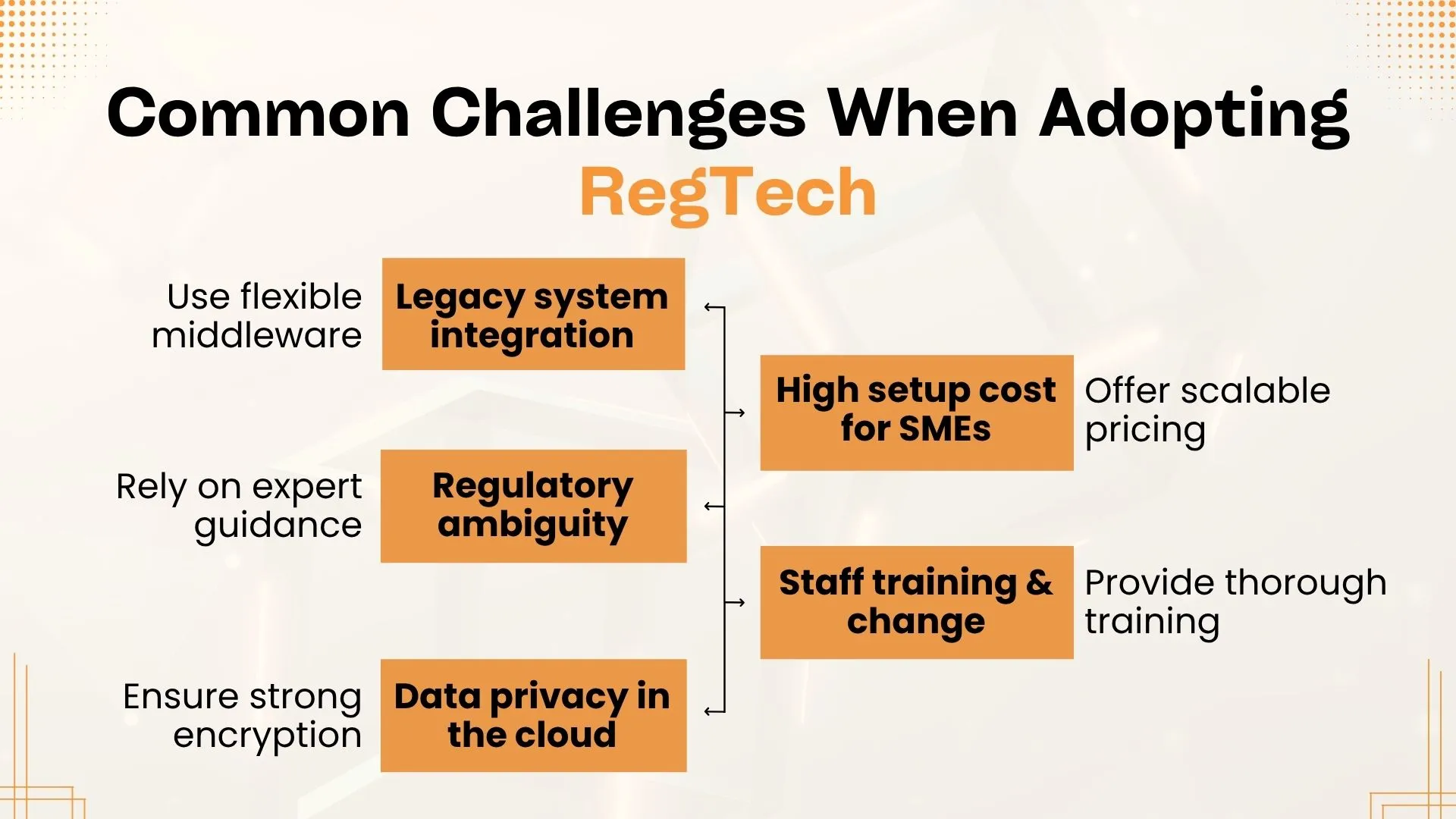
Growing Importance of Real-Time Compliance
- AI in compliance and cloud tech now enables real-time insights and continuous monitoring.
- Compliance workflows are becoming automated, replacing periodic audits.
- Improves operational performance and helps compliance officers act quickly.
Integration of Compliance-as-a-Service (CaaS)
- Fintech firms benefit from outsourced compliance, reducing operational costs.
- Offers a comprehensive solution to handle complex regulations and reporting needs.
- Reduced costs and faster setup make CaaS one of the major benefits for scaling fintechs.
Collaboration with Regulators
- RegTech fosters partnerships with compliance analysts, regulatory bodies, and fintechs.
- Encourages frameworks to manage future challenges and stay compliant with environmental regulations and market risk policies.
Market Growth and Key Players
- Demand for compliance process automation is fueling RegTech expansion.
- The regtech market is experiencing significant growth, with the regtech market size expected to double in the coming years.
- Leading names like Ascent RegTech, Cube RegTech, Apex Fintech Solutions, and Synapse Fintech are shaping the market.
- They deliver tailored solutions for Identity management, compliance reporting, and advanced data analytics.
Focus on Governance, Risk, and Compliance (GRC) Tools
- GRC tools now align compliance workflows with broader business strategies.
- Helps companies tackle the biggest challenges in compliance and manage market risk effectively.
- Enables compliance officers to oversee systems that ensure both regulation and innovation coexist.
Conclusion
In the rapidly evolving fintech sector, RegTech offers a smarter approach to compliance, combining control with innovative solutions. It transforms traditional manual processes into intelligent, automated workflows that reduce compliance costs, boost efficiency, and support sustainable growth.
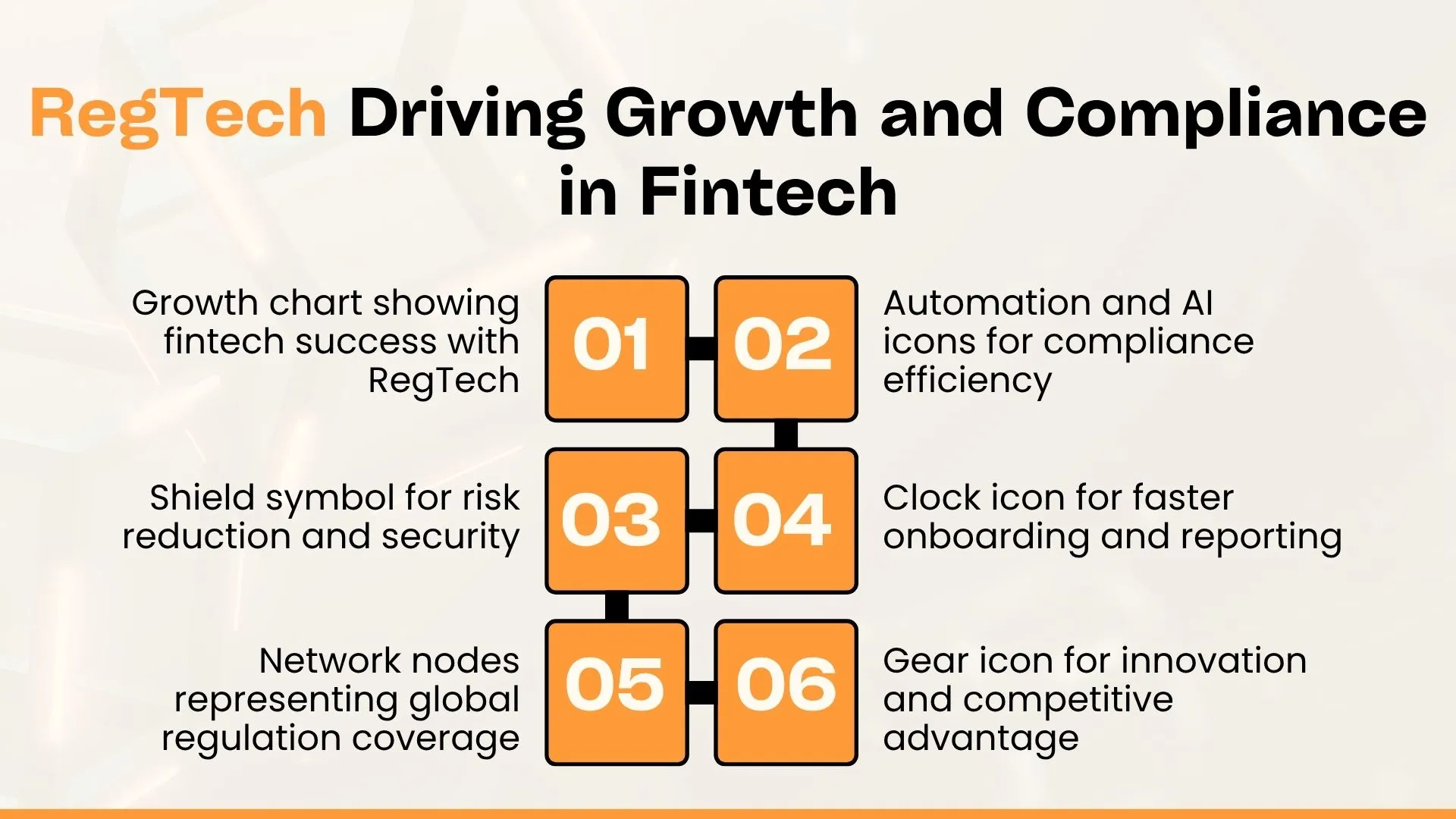
Key Takeaways:
- RegTech simplifies complex compliance tasks by using compliance automation platforms, fintechs simplify and regulatory processes, ensuring compliance with regulations.
- Advanced tools support real-time transaction monitoring, real-time data analysis, and timely reporting.
- Helps detect financial crime, mitigate operational risk, and prevent regulatory violations and reputational damage.
- Enhances customer experience through faster onboarding and better fraud detection.
- Enables regulatory reports generation and submission with higher accuracy.
- Reduces compliance efforts through AI-driven compliance systems and real-time data.
- Supports regulatory expertise across a wide range of jurisdictions and financial regulations.
- Provides cost savings by automating financial transactions, and financial reporting, and reducing human error.
- Assists in navigating regulatory challenges and engaging with regulatory bodies through regulatory sandboxes.
- Gives valuable insights into potential risks, enabling a proactive approach to risk and compliance.
- Delivers a competitive edge in an innovation-driven landscape powered by advanced technologies and innovative technology.
By integrating RegTech, fintech companies can turn regulatory requirements into strategic advantages ensuring growth, trust, and market leadership.
People Also Ask
In What Ways Does RegTech Enhance Risk Management in Financial Services?
RegTech enhances risk management by automating risk assessments and enabling real-time compliance monitoring in financial services.
How Does RegTech Streamline Regulatory Reporting and Audit Processes?
RegTech streamlines regulatory reporting and audits by automating data collection and ensuring accurate, timely submissions.
What Are the Differences Between RegTech and Traditional Compliance Methods?
Unlike slower, manual old techniques, RegTech leverages advanced technologies like automation and artificial intelligence (AI) to improve productivity and real-time compliance.
What Are the Best Practices for Fintech Startups to Adopt RegTech Solutions?
Fintech startups adopt RegTech by choosing scalable, cloud-based platforms that automate compliance for KYC, AML, and risk management.
How Do RegTech Platforms Ensure Data Privacy and Compliance?
RegTech platforms ensure data privacy through encryption, strict access controls, and compliance with regulations like GDPR.





%201.webp)
